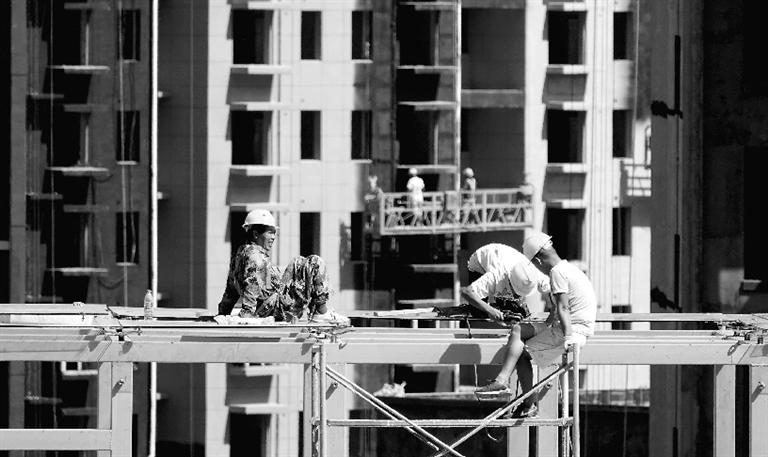
CHINA’S new home prices rose in July as the property sector held up as one of the few bright spots in the slowing economy, although easing momentum in some markets took immediate pressure off regulators to unleash major new curbs to deter speculation. Average new home prices in China’s 70 major cities rose 0.6 percent in July from the previous month, unchanged from growth reported in June and marking the 51st straight month of gains, according to National Bureau of Statistics (NBS) data issued Thursday. On a year-on-year basis, home prices rose at their weakest pace this year in July by 9.7 percent, slowing from a 10.3 percent gain in June. Analysts said the moderate gains were a positive sign the market was not overheating. That helped the CSI300 real estate index recoup some of its earlier heavy losses following a major slide in global stock markets. “Today’s data are actually pretty good, reflecting that tougher stance and not alarming at all,” said David Ji, head of research and consultancy, greater China at Knight Frank, referring to central policymakers’ July decision to not use the property market as a form of short-term stimulus. “If I were a provincial official who has a ‘key performance indicator’ to hit, I would feel happy because it is clearly telling you the property market is off the peak.” China’s pledge in July not to overly stimulate the property sector was interpreted by analysts as a warning to the investors against heavy bets on the market. The government has clamped down on speculative investment in the housing market since 2016 to prevent a sharp correction as prices soared. There have also been growing concerns that high house prices are pushing up the cost of business and restricting consumer spending. But efforts by some regional governments to attract talent through home purchase incentives, along with easing credit conditions, have kept prices surprisingly resilient this year. The majority of the 70 cities surveyed by the NBS still reported a monthly price increase for new homes, although the number of cities fell to 60 in July from 63 cities in June. In a sign the market’s resilience may be waning in parts, property investment slowed to its weakest this year, data showed Wednesday. Authorities have sought in recent years to contain risks in the often volatile property market while not undermining growth in the broader economy. The property sector directly impacts over 40 industries in China and a fast deterioration would risk adding pressure to the economy, which is slowing due to weak domestic demand and an escalating trade war with the United States. While tightening measures have been rolled out across hundreds of Chinese cities, price trends have been uneven across the country. Prices are holding up better than expected, particularly in top tier cities, said Rosealea Yao, China investment analyst with Gavekal Dragonomics. Average prices in the four tier-1 cities — Beijing, Shanghai, Guangzhou and Shenzhen — rose 0.3 percent from a month earlier, quickening from a 0.2 percent gain in June, NBS data showed. Pingdingshan, a city of 4.9 million in Henan Province, was the top price performer in July, with a robust monthly gain of 1.6 percent. But economists also caution that the negative impact on the sector from the Central Government’s increasingly hawkish stance will only start to become more pronounced in two to three months. China’s banks extended surprisingly fewer new yuan loans in July, reflecting subdued demand. New household loans, mostly mortgages, fell to 511.2 billion yuan in July from 671.7 billion yuan in June. Tier-2 cities, which include most of the larger provincial capitals, increased 0.7 percent in July versus a 0.8 percent rise in the previous month. And tier-3 cities rose 0.7 percent on a monthly basis, in line with June’s pace. (SD-Agencies) | 
